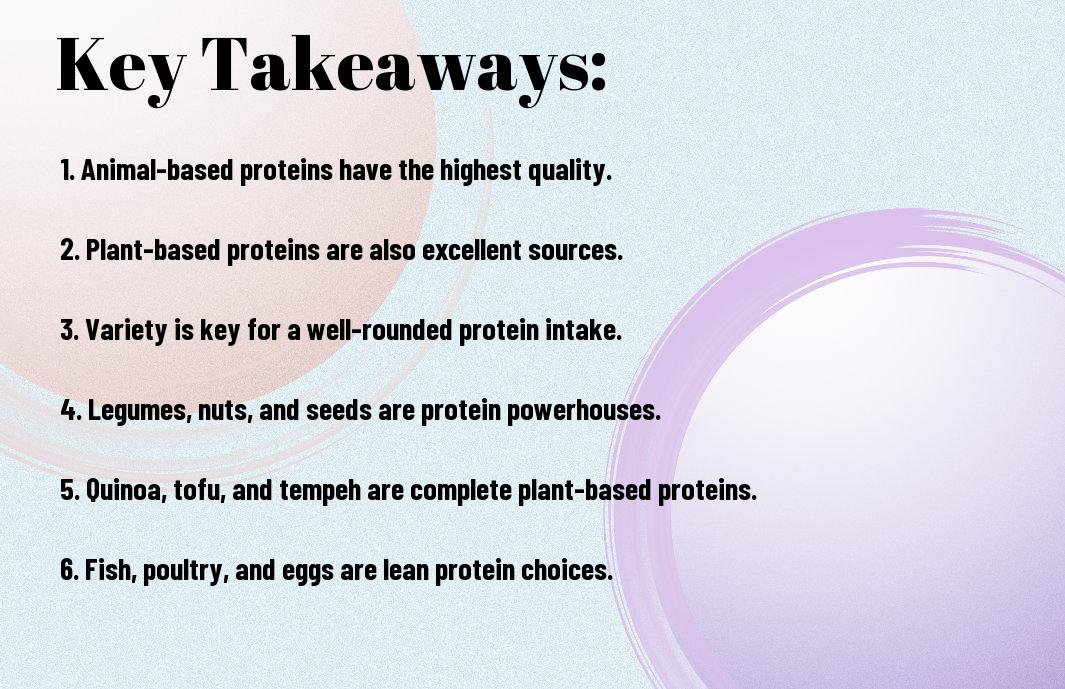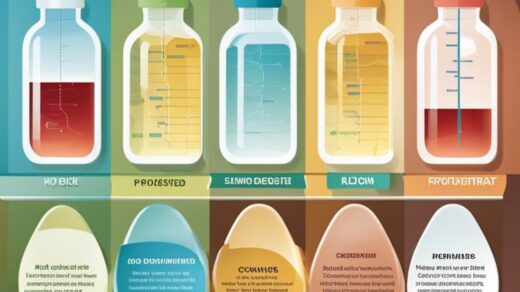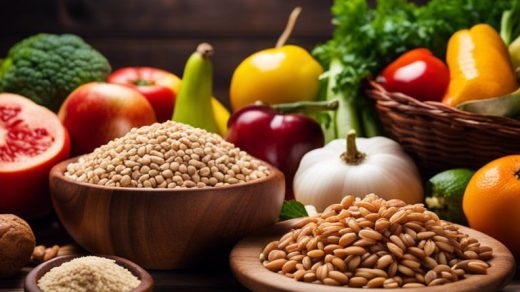You may be wondering, “Which food is king of protein?” If you’re looking to up your protein intake, knowing the best sources can be key. In this informative blog post, we’ll explore the top contenders for the title of protein king and why they deserve a spot on your plate. To learn more about 7 Foods High in Protein, check out here.
Key Takeaways:
- Animal sources such as chicken, beef, and fish provide high-quality protein.
- Plant-based sources like beans, lentils, and quinoa are also excellent sources of protein and offer additional health benefits.
- Variety is key to ensuring you get all the imperative amino acids your body needs, so incorporating a mix of animal and plant-based proteins in your diet is ideal.

Protein Powerhouses
Lean Meats
For meats, lean options like chicken breast, turkey, and lean cuts of beef are excellent sources of protein. These meats are not only high in protein but also lower in saturated fats compared to fattier cuts. Including these lean meats in your diet can help you meet your protein needs while keeping your overall fat intake in check.
Fish and Seafood
Powerhouses when it comes to protein, fish and seafood are packed with important nutrients like Omega-3 fatty acids, which are good for your heart health. Options like salmon, tuna, and shrimp are not only delicious but also provide a substantial amount of protein per serving. Including a variety of fish and seafood in your diet can add a flavorful twist to your protein intake.
Lean and full of flavor, fish and seafood can be a great addition to your meals to boost your protein intake while enjoying a delicious and nutritious meal.
Eggs-traordinary Sources
Now, if you’re looking for a comprehensive list of protein-rich foods, you should definitely check out 30 Foods High In Protein. Among these protein powerhouses, eggs stand out as a versatile and affordable option that can easily be incorporated into your diet in various ways.
Chicken Eggs
Eggs are a classic go-to when it comes to increasing your protein intake. Each chicken egg packs around 6 to 7 grams of protein, making them a convenient and nutritious choice for any meal of the day.
Duck Eggs
Duck eggs are a less common but equally nutritious alternative to chicken eggs. With about 9 grams of protein per egg, they offer a slightly higher protein content and a richer taste compared to their chicken counterparts.
It’s worth noting that duck eggs have a larger yolk-to-white ratio, giving them a creamier texture and a more robust flavor profile. If you’re looking to switch things up in the kitchen, duck eggs can be a delicious and protein-packed option to try out.
Quail Eggs
An often-overlooked protein source, quail eggs may be small in size but they are mighty in terms of nutrient content. Each quail egg contains approximately 1.2 grams of protein, making them a protein-dense snack or ingredient to add to salads, soups, or as a garnish.
Plus, quail eggs are rich in vital nutrients such as iron, vitamins B12 and D, and antioxidants, making them not only a protein powerhouse but also a nutritional boost for your overall well-being.
Dairy Delights
Not all dairy products are created equal when it comes to protein content. In this section, we will explore some popular dairy options and their protein-packed benefits.
Milk
Any time you’re looking to boost your protein intake, a glass of milk can be a great option. One cup of milk typically contains around 8 grams of protein, making it a convenient and tasty way to add more protein to your diet. Whether you prefer cow’s milk, almond milk, or soy milk, each variety offers a good source of protein to support your daily needs.
Greek Yogurt
Any time you’re in need of a creamy and protein-rich snack, Greek yogurt is a fantastic choice. With nearly double the protein content of regular yogurt, Greek yogurt packs a powerful protein punch. It’s versatile enough to enjoy on its own, mixed with fruit, or even as a base for smoothies or dressings.
It’s important to note that Greek yogurt also contains probiotics, which are beneficial for gut health. This combination of protein and probiotics makes Greek yogurt a stellar option for a nutritious and satisfying snack or meal.
Cottage Cheese
Cottage cheese is another dairy product that is high in protein and low in carbs, making it a popular choice among fitness enthusiasts. With around 14 grams of protein per half cup serving, cottage cheese can help keep you feeling full and satisfied throughout the day. It’s also a versatile ingredient that can be added to salads, smoothies, or enjoyed on its own as a snack.
Cottage cheese is a good source of casein protein, which is a slow-digesting protein that can help maintain muscle protein synthesis overnight. This makes it an excellent option for a bedtime snack to support muscle recovery and growth.
To maximize your protein intake, consider incorporating a variety of dairy products like milk, Greek yogurt, and cottage cheese into your daily meals and snacks. These delicious and nutritious options can help you meet your protein goals while enjoying the benefits of dairy in your diet.
Plant-Based Protein Champions
Many plant-based foods pack a protein punch, providing you with necessary amino acids for a balanced diet. Here are some standout champions in plant-based proteins:
Legumes (Lentils, Chickpeas, Black Beans)
For a hearty dose of protein, look no further than legumes like lentils, chickpeas, and black beans. These humble beans are not only rich in protein but also high in fiber, making them a satiating and nutritious choice for your meals. Whether you’re enjoying a spicy lentil curry, a creamy hummus dip, or a flavorful black bean salad, these legumes are versatile and delicious additions to your diet.
Nuts and Seeds (Almonds, Chia Seeds, Hemp Seeds)
Plant-based protein sources like almonds, chia seeds, and hemp seeds are nutritional powerhouses that can be easily incorporated into your daily meals. Almonds are not only a great source of protein but also provide healthy fats, while chia seeds and hemp seeds offer a good dose of omega-3 fatty acids along with their protein content. Sprinkle these nuts and seeds on your yogurt, salads, or smoothie bowls for an added protein boost.
To make the most of the protein benefits of nuts and seeds, try incorporating them into your breakfast routine. A handful of almonds or a sprinkle of chia seeds on your morning oatmeal can help kickstart your day with a nutritious protein boost.
Whole Grains (Quinoa, Brown Rice, Whole Wheat)
Whole grains like quinoa, brown rice, and whole wheat are not only excellent sources of carbohydrates but also pack a notable amount of protein. Quinoa, in particular, is a complete protein, containing all nine necessary amino acids your body needs. Brown rice and whole wheat pasta also offer a decent protein content, making them valuable additions to your plant-based protein arsenal.
Whole grains can be the foundation of a satisfying and protein-rich meal. You can pair quinoa with roasted vegetables, toss brown rice in a stir-fry, or opt for whole wheat pasta with a homemade marinara sauce for a hearty and nutritious dish. Incorporating these whole grains into your meals can help you meet your protein needs while enjoying a diverse and flavorful diet.

Protein-Rich Fungi
Despite their delicate appearance, fungi can be a surprisingly rich source of protein. Some varieties of mushrooms, such as shiitake and portobello, pack a powerful protein punch that can be a great addition to your diet.
Shiitake Mushrooms
Any fan of Asian cuisine will likely be familiar with shiitake mushrooms, known for their rich, savory flavor. These fungi are not only delicious but also a great source of protein. Adding shiitake mushrooms to your stir-fries or soups can boost the protein content of your meal, making it a satisfying and nutritious option.
Portobello Mushrooms
The large and meaty portobello mushrooms are another protein powerhouse when it comes to fungi. These mushrooms are not only tasty but also versatile, making them a great option for vegetarian burgers or grilled as a hearty main dish. Including portobello mushrooms in your meals can help increase your protein intake in a delicious way.
Portobello mushrooms are also a good source of other crucial nutrients such as fiber, vitamins, and minerals. They are low in calories but high in protein, making them a great option for those looking to maintain a healthy weight while still meeting their protein needs.
Mushrooms
Comparing Protein Content
Grams of Protein per Serving
Your journey to find the king of protein begins with comparing the grams of protein per serving of different foods. This information is crucial in determining which foods can provide you with the highest protein content to meet your dietary needs.
| Foods | Grams of Protein per Serving |
| Chicken Breast | 30g |
| Greek Yogurt | 15g |
| Quinoa | 8g |
Bioavailability and Absorption Rates
For a deeper look into protein content, you also need to consider the bioavailability and absorption rates of different foods. Bioavailability refers to how easily your body can absorb and use the protein in a particular food, while absorption rates determine how quickly the body can utilize the protein.
| Foods | Bioavailability |
| Whey Protein | High |
| Beans | Medium |
| Nuts | Low |
For instance, whey protein is known for its high bioavailability, meaning it is easily absorbed by the body and can be utilized quickly. On the other hand, nuts have a lower bioavailability, making it a slower source of protein for the body to process.

To wrap up
Drawing together the information presented in this article, it is evident that various foods can be considered the “king of protein” depending on specific nutritional needs and personal preferences. Foods like chicken, beef, tofu, and beans all have their own unique benefits and can be excellent sources of protein in a well-balanced diet. Remember to consider factors such as protein quality, bioavailability, and environmental impact when choosing which protein-rich foods to incorporate into your meals.
Ultimately, the best protein-rich food for you is one that aligns with your dietary requirements, tastes great, and can be enjoyed in a sustainable manner. Experiment with different protein sources to find what works best for you and remember that incorporating a variety of foods into your diet is key to meeting your nutritional needs. So whether you prefer a juicy steak, a hearty bowl of beans, or a plant-based tofu stir-fry, there are plenty of options available to help you reach your protein goals and maintain a healthy lifestyle.
FAQ
Q: What food is the king of protein?
A: The king of protein-rich foods is chicken breast. It is low in fat and high in protein, making it a popular choice among fitness enthusiasts and bodybuilders.
Q: Can plant-based foods be good sources of protein?
A: Yes, plant-based foods such as tofu, lentils, quinoa, and chickpeas are excellent sources of protein. They are also rich in fiber and other necessary nutrients.
Q: How much protein should I consume daily?
A: The recommended daily intake of protein varies depending on factors such as age, sex, and activity level. However, a general guideline is to consume about 0.8 grams of protein per kilogram of body weight. Consult with a nutritionist or healthcare provider for personalized recommendations.



